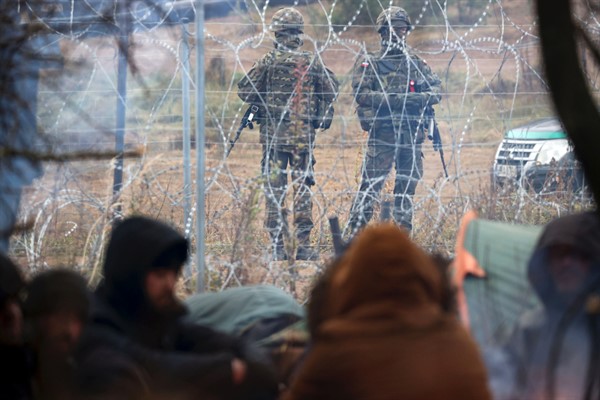There is growing frustration across Europe with the European Union’s slow reaction to what the bloc’s leaders are calling “hybrid warfare” at its eastern border with Belarus. But fraught relations with Poland, the member country most affected by the crisis, are complicating a collective response, with growing concerns that a further round of sanctions will escalate the conflict not only with Belarusian President Alexander Lukashenko, but also with his main ally, Russian President Vladimir Putin.
To get a better sense of what’s happening at the Belarus-Poland border today, we have to go back to August 2020, when Belarus held a presidential election that the domestic opposition and international observers largely agree was rigged to guarantee Lukashenko’s reelection. When the country subsequently erupted into months of mass protests, state security forces responded with a brutal crackdown. Months of severe repression culminated in May, when the Belarusian air force forced the landing of a Ryanair flight traveling through Belarusian airspace from Greece to Lithuania in order to arrest a Belarusian dissident on board. Having already applied sanctions for the fraudulent election and crackdown on protests, the EU imposed a new round of measures targeting Lukashenko and key members of his administration after that incident.
In response, Lukashanko has for months now been incentivizing migrants from the Middle East and elsewhere to fly to Minsk, from where the Belarusian government transports them to the country’s border with Poland and sends them across in wooded areas away from the official border crossings. Before now, the Belarus-Poland border was not a hotspot for undocumented migration into the EU, in part because the passage by land is impractical, but also because Poland, which is not a very welcoming place for migrants, is usually not their intended final destination. But the migrants currently seeking to cross the border have reportedly been told by Belarusian officials that once they make it into Poland, they will be able to proceed onward to any EU country without facing a border control. Belarus is also sending migrants over the border with Lithuania and, to a lesser extent, Latvia, both of which—like Poland—are EU member states within the bloc’s passport-free Schengen Area.

